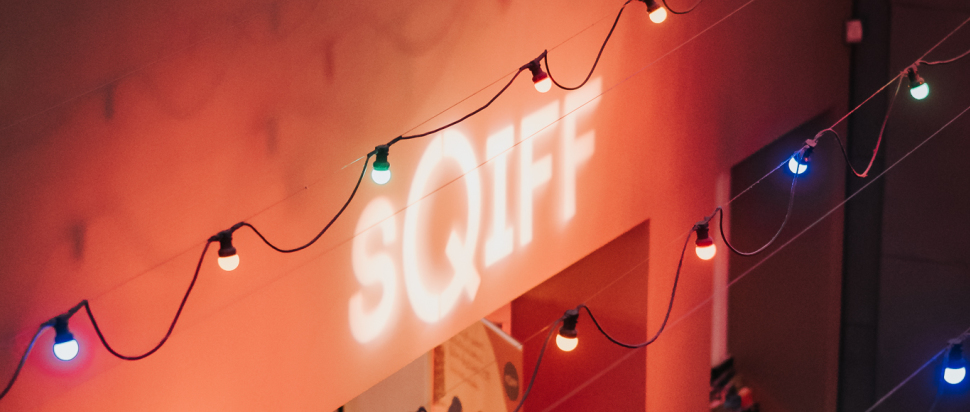All change at Scottish Queer International Film Festival
Scottish Queer International Film Festival’s new programmers Nat Lall and Jamie Rea tell us what they're bringing to this always lively and inclusive celebration of LGBTQIA+ filmmaking
It’s all change at the upcoming Scottish Queer International Film Festival. The seventh edition sees Nat Lall and Jamie Rea take the reins as co-programmers and they’ll be delivering the festival’s first hybrid edition, with events taking place 6 to 10 October in-person at the festival’s usual hub in CCA Glasgow, with some available online. But elsewhere, this is the same old SQIFF, with a fierce commitment to marginalised queer stories that aren’t given space at other LGBTQIA+ festivals, never mind mainstream cinemas.
New Scottish queer filmmaking talent gets a typically good showing this year, with a brace of programmes featuring LGBTQIA+ shorts made locally. There’s a showcase of films from deaf filmmakers called A New Chapter Begins. Also look out for shorts programmes exploring kink (Spill your Kinky), gender and gaming (GA(Y)MERS), and queer science fiction (Sci-fi Happening). Among the features, meanwhile, are Adam, a sweet comedy about a cis boy who’s confused for a trans boy by the girl he likes, and cult lesbian action-comedy D.E.B.S.
We speak to SQIFF’s new programming team to find out more.
The Skinny: Were there any new elements you were keen to bring to the festival this year?
Jamie Rea: Well, as a deaf curator, that is a new and exciting element that the festival will have this year. It means I have been able to privilege deaf creativity in screenings and in the programming of the festival. I’ve brought deaf filmmakers to the festival as well as deaf guest speakers. And, for the first time ever, we’ll have creative conversations in sign language – my first language – and that’s a very new thing for the festival.
Can you tell me a bit more about that programme featuring work by deaf filmmakers?
JR: This year we tried to really honour deaf filmmakers in the programme. Each of these films offers a piece of dynamic and creative filmmaking. Some films are from the US and some from the UK but they’re all about deaf people finding love and making connections. They are films about people, really – but we see deaf creativity, how difficult communication barriers can be in relationships and the power of sign language.
SQIFF has been one of the most forward-thinking festivals in Scotland in terms of accessibility and inclusion – for example, with its sliding-scale pricing policy. Why do you think SQIFF, in particular, has been at the forefront of making these inclusive policies more widespread in Scottish film exhibition culture?
Nat Lall: Well, for one it isn't run by a white, cis, straight, non-disabled man lol. That makes a BIG difference. The team is diverse, like actually, not like performatively. I don't feel like a token. Especially in terms of disabilities. I think disability can often get left out of 'intersectional' queer discourse. Yes, sexuality matters, race matters, class matters... and so does disability.
There's also a focus, this year, on gaming culture, which is most associated – in the mainstream imagination at least – with straight cis men. Can you tell me why you wanted to include that strand?
NL: Honestly, I'm so far removed from that idea as I game lots but rarely with straight cis men. But, you're right in terms of mainstream associations. Gaming can be a great way to take on another body in an alternative realm. Or even to 'test-drive' a different body before modifying your own in the physical realm. It's a way to experiment with gender for sure.
I've done a lot of personal research into gender and gaming. A lot of games actually have a high percentage of women players, especially over the last decade. It is just that the games women tend to play are not seriously considered as games. For example, would your nan who plays Candy Crush all day consider herself a gamer? There's plenty more to say but I'll leave that for the GA(Y)MERS screening Q&A.
What makes a film festival like SQIFF so important to the LGBTQ+ community?
JR: Celebration. In the same way that Pride celebrates the LGBTQ+ community, so does SQIFF. It’s a place to share our stories, express ourselves and honour our creativity. SQIFF is a blank canvas. It allows LGBTQ+ artists to come together and create and share the work we do. It’s a gateway to that beautiful place where we meet, make new connections and enjoy the films that the LGBTQ+ community have offered us.
SQIFF takes place 6-10 Oct, CCA Glasgow, with some events and screenings available online. For the full programme and tickets, head to sqiff.org
